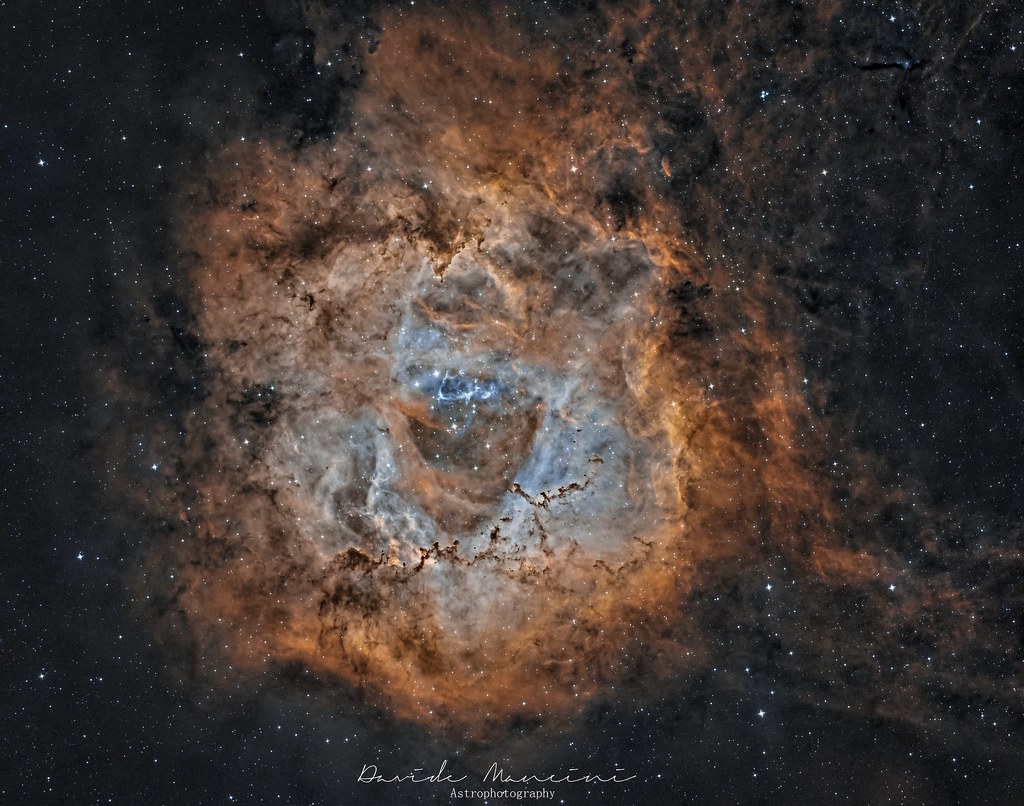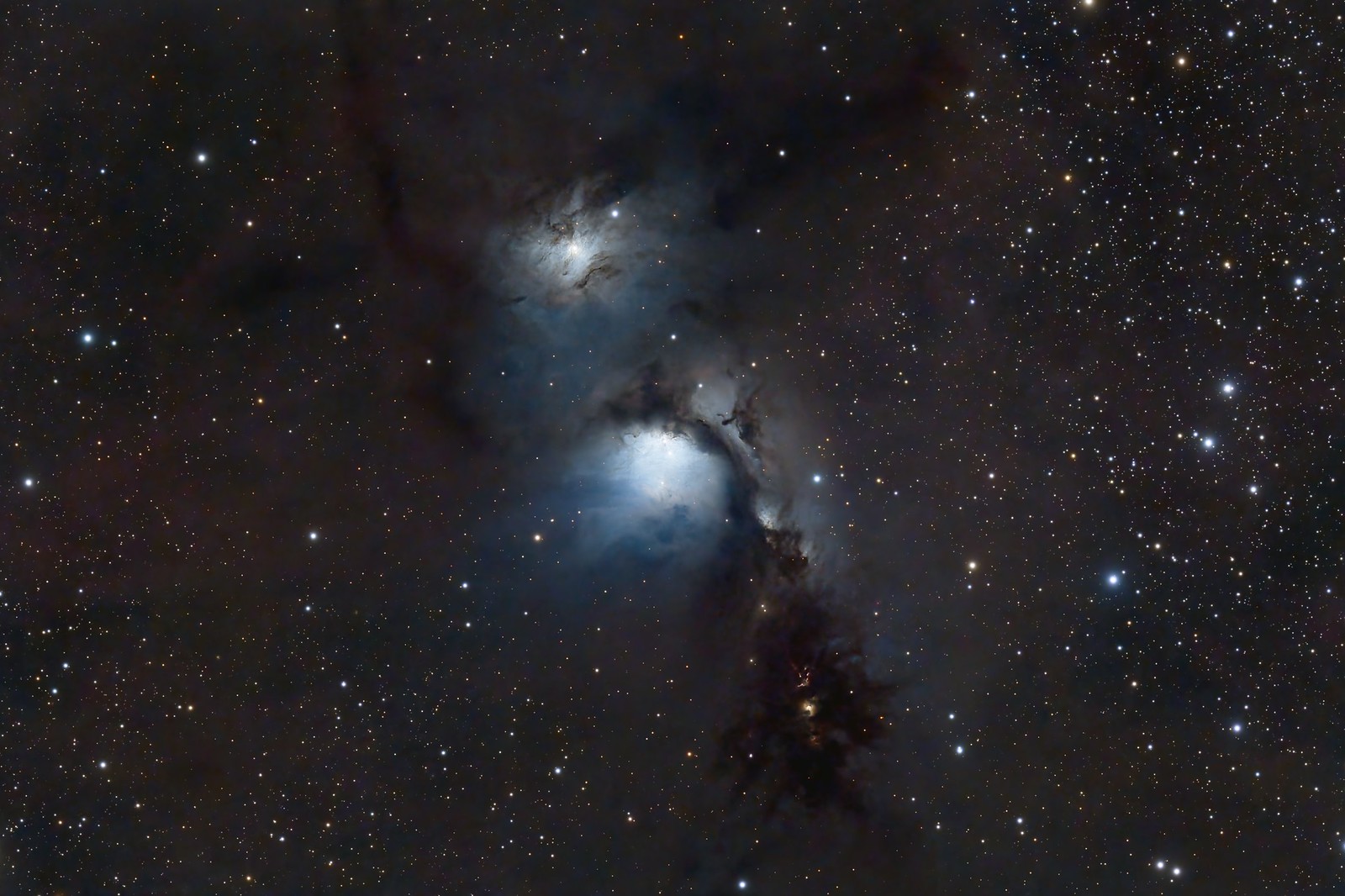Submissions: 2022 December
- felopaul
- Ensign
- Posts: 96
- Joined: Mon Apr 29, 2013 7:14 pm
- AKA: Felopaul
- Location: Flagey (France)
- Contact:
Re: Submissions: 2022 December
NGC 6744
LRGB : full size/info : http://www.cielaustral.com/galerie/photo142.html
12 Hrs total frames
done with CDK 610, Moravian C4-16000 on PW L600 mount near Actacama Desert in Chile, El Sauce Observatory
http://www.cielaustral.com
Copyright: Team CielAustral with J.C CANONNE, M. SELBY, G.CHASSAIGNE, N.OUTTERS, P. BERNHARD, D. CHAPLAIN & L. BOURGON
LRGB : full size/info : http://www.cielaustral.com/galerie/photo142.html
12 Hrs total frames
done with CDK 610, Moravian C4-16000 on PW L600 mount near Actacama Desert in Chile, El Sauce Observatory
http://www.cielaustral.com
Copyright: Team CielAustral with J.C CANONNE, M. SELBY, G.CHASSAIGNE, N.OUTTERS, P. BERNHARD, D. CHAPLAIN & L. BOURGON
Re: Submissions: 2022 December
Hi guys,NGC2170
Telescope: SharpStar 150 f2,8
Guide Scope:Evoguide
Mount : Skywatcher HEQ5
Imaging camera: ZWO 2600MC
Guiding camera: ZWO 290 MC
Filters: Lpro
Plate solving: SGpro
Imaging software: Sgpro
Guiding software: PHD2
Processing software: Pixinsight/PS
Lpro: 72x600s exposure @ 0 Gain
Integration: 12 hrs
Telescope: SharpStar 150 f2,8
Guide Scope:Evoguide
Mount : Skywatcher HEQ5
Imaging camera: ZWO 2600MC
Guiding camera: ZWO 290 MC
Filters: Lpro
Plate solving: SGpro
Imaging software: Sgpro
Guiding software: PHD2
Processing software: Pixinsight/PS
Lpro: 72x600s exposure @ 0 Gain
Integration: 12 hrs
-
vanamonde81
- Science Officer
- Posts: 143
- Joined: Fri Apr 12, 2013 7:46 am
-
Julien Looten
- Ensign
- Posts: 39
- Joined: Tue Mar 08, 2022 7:08 pm
Re: Submissions: 2022 December
Meteor, Milky Way and airglow above a Romanesque church in France. 
Full : https://www.flickr.com/photos/julienloo ... en-public/
Copyright: Looten Julien
I had set myself an end of year goal, to make an image of a French monument, under the Milky Way, and with (a bit of luck) a Geminid meteor. It is done. For this, I had to take into account several parameters: choose a place facing south, free of light pollution. And choose a moonless window and a clear sky.
The medieval church of Sainte-Radegonde, visible in the foreground, is situated on a rocky promontory overlooking the Gironde estuary. It overlooks the fortified village of Talmont-sur-Gironde.
The Geminids are a swarm of shooting stars visible every year in December, when the Earth crosses its path. This year, the peak took place around 10-12 December... But on that date, the full moon took place. The Milky Way was therefore not visible, because of the strong luminosity emitted by the Moon. So I made this image on December 16, as soon as the conditions were optimal. A single shooting star passed by my field of view, next to the Pleiades, around 11pm.
The sky seems to be covered with "multicoloured clouds"... This is not a question of spurious colours or special processing. It is a rare natural phenomenon caused by a chemical reaction in the upper atmosphere, where the sun's rays excite molecules, which then emit a very weak light (chemiluminescence) of green and/or orange colour. It is called airglow. This evening, it was very, very intense...
In the sky, we can distinguish a part of the Milky Way, centred on the constellation of Orion. This constellation is easily recognisable by the three stars aligned in its belt. It consists of the Horsehead Nebula and the famous Orion Nebula.
The whole is surrounded by a gigantic nebula, Barnard's Loop (a red half-arc). To the left of Orion is the constellation of the Unicorn. It is also composed of red nebulae, including the Rosette Nebula and the Christmas Tree Nebula. Higher still, Mars, the Pleiades and the California Nebula.
Exif : Here is the final image: panorama of 6 photos taken with the Sigma 28mm f/1.4 - Canon 6d Astrodon. 15 minutes exposure (stacking, 13s each). 2000 iso - F/2. No tracking.
Thanks in advance
Instagram : https://www.instagram.com/j.looten/?hl=fr
Flickr (full hd) : https://www.flickr.com/photos/julienlooten/
Facebook : https://www.facebook.com/Julien.Looten.Photographie/
Full : https://www.flickr.com/photos/julienloo ... en-public/
Copyright: Looten Julien
I had set myself an end of year goal, to make an image of a French monument, under the Milky Way, and with (a bit of luck) a Geminid meteor. It is done. For this, I had to take into account several parameters: choose a place facing south, free of light pollution. And choose a moonless window and a clear sky.
The medieval church of Sainte-Radegonde, visible in the foreground, is situated on a rocky promontory overlooking the Gironde estuary. It overlooks the fortified village of Talmont-sur-Gironde.
The Geminids are a swarm of shooting stars visible every year in December, when the Earth crosses its path. This year, the peak took place around 10-12 December... But on that date, the full moon took place. The Milky Way was therefore not visible, because of the strong luminosity emitted by the Moon. So I made this image on December 16, as soon as the conditions were optimal. A single shooting star passed by my field of view, next to the Pleiades, around 11pm.
The sky seems to be covered with "multicoloured clouds"... This is not a question of spurious colours or special processing. It is a rare natural phenomenon caused by a chemical reaction in the upper atmosphere, where the sun's rays excite molecules, which then emit a very weak light (chemiluminescence) of green and/or orange colour. It is called airglow. This evening, it was very, very intense...
In the sky, we can distinguish a part of the Milky Way, centred on the constellation of Orion. This constellation is easily recognisable by the three stars aligned in its belt. It consists of the Horsehead Nebula and the famous Orion Nebula.
The whole is surrounded by a gigantic nebula, Barnard's Loop (a red half-arc). To the left of Orion is the constellation of the Unicorn. It is also composed of red nebulae, including the Rosette Nebula and the Christmas Tree Nebula. Higher still, Mars, the Pleiades and the California Nebula.
Exif : Here is the final image: panorama of 6 photos taken with the Sigma 28mm f/1.4 - Canon 6d Astrodon. 15 minutes exposure (stacking, 13s each). 2000 iso - F/2. No tracking.
Thanks in advance
Instagram : https://www.instagram.com/j.looten/?hl=fr
Flickr (full hd) : https://www.flickr.com/photos/julienlooten/
Facebook : https://www.facebook.com/Julien.Looten.Photographie/
Re: Submissions: 2022 December
Geminids Meteor Shower and the Winter Milky Way
Image is a composite of the 2022 Geminids meteor shower and the Winter Milkyway Sky with Mars and Taurus, Orion, Auriga, Monoceros, and Perseus constellations Barnard's Loop with Horsehead, flame, and Orion nebulae. Flaming Star, California, Jellyfish, Rosetta, Cone, Pleiades & Seagull Nebulae.
Image captures and summaries the majestic night of the 14th to the 15th of December in Al Fayoum Desert in Egypt.
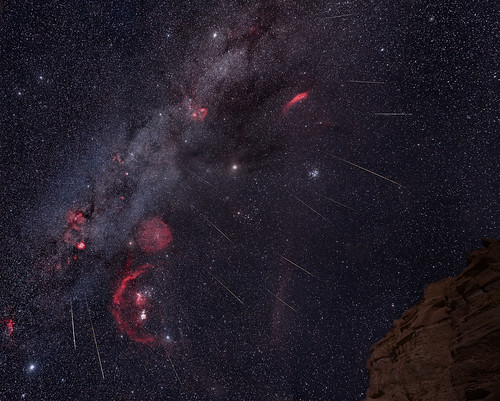 Geminids WMW by Ahmed Waddah, on Flickr
Geminids WMW by Ahmed Waddah, on Flickr
Sky:
Nikon Z6II- Astro modified
Astronomic CLS Filter
Nikon 14-24mm
Meteor & Foreground:
Nikon D850
Samyang 14mm
Ioptron SGP
Facebook: https://www.facebook.com/waddah.photography/
Astrobin: https://www.astrobin.com/users/WolfHeart/
IG: https://www.instagram.com/waddahphotography/
Image is a composite of the 2022 Geminids meteor shower and the Winter Milkyway Sky with Mars and Taurus, Orion, Auriga, Monoceros, and Perseus constellations Barnard's Loop with Horsehead, flame, and Orion nebulae. Flaming Star, California, Jellyfish, Rosetta, Cone, Pleiades & Seagull Nebulae.
Image captures and summaries the majestic night of the 14th to the 15th of December in Al Fayoum Desert in Egypt.
 Geminids WMW by Ahmed Waddah, on Flickr
Geminids WMW by Ahmed Waddah, on FlickrSky:
Nikon Z6II- Astro modified
Astronomic CLS Filter
Nikon 14-24mm
Meteor & Foreground:
Nikon D850
Samyang 14mm
Ioptron SGP
Facebook: https://www.facebook.com/waddah.photography/
Astrobin: https://www.astrobin.com/users/WolfHeart/
IG: https://www.instagram.com/waddahphotography/
Re: Submissions: 2022 December
A Journey in California
After a little bit less than 2 months (due to the bad weather and some optimization), I am happy to share you my first target with my new setup. Let me present you the California Nebula (NGC 1499), this nebula located in the constellation Perseus lies at a distance of about 1,500 light years from Earth and is almost 70 light years long. Mainly emitting in Halpha, I present you my HOO version.
It tooks me 9 nights, more than 500 pictures kept for around 29h of integration (155*300s in Ha, 174*300s in OIII and 60*30s in RGB for the stars).
For this pic, I've choosen an HOO version. I hope that you will appreciate my version of the California Nebula.
https://www.astrobin.com/kjlfkx/H/
Exifs :
Ha: 155*300s (2h55)
OIII: 174*300s (2h10)
Stars RGB : 60*30s
DOF: 41
Camera: ASI 1600 MMpro
Mount: EQ6-r PRO
ASIAIR V1
Mini guide ZWO
Guiding Cam : Asi 224Mc
Preprocess and process: Pixinsight and Photoshop
More details can be found following the Astrobin link
Last edited by bystander on Tue Dec 20, 2022 4:55 pm, edited 1 time in total.
Reason: all <img> type tags require image urls not page urls
Reason: all <img> type tags require image urls not page urls
- Vincent Bchm
- Asternaut
- Posts: 5
- Joined: Tue Apr 04, 2017 1:27 pm
Re: Submissions: 2022 December
A Southern Analemma of the Sun
Same place, same hour, same camera, same lens over one full year.
From the shore of the Nahuel Huapi lake (San Carlos de Bariloche, Argentina) between November 2021 and November 2022.
Each Sun has been shot at 18:09 local time (21:09 UTC).
A first shot has been taken with a solar filtar. Right after a second one has been taken without the filter to use the landscape as a reference for further alignment between all images.
The orangish haze comes from the setting sun, the last rays of light going through the Blest arm of the Nahuel Huapi lake.
The landscape image is a stack of various shots to produce this blurry effect on the water.
Thanks for watching, clear skies!
Acquisition: Vincent Bouchama, with help of Carla Di Taranto who did some shots while I was on vacation
Processing: Vincent Bouchama
Astrobin: astrobin.com/vincent.bchm
Instagram: @vincent.bchm
Full size file can be downloaded here: https://www.flickr.com/photos/vincent_b ... 9/sizes/l/
Same place, same hour, same camera, same lens over one full year.
From the shore of the Nahuel Huapi lake (San Carlos de Bariloche, Argentina) between November 2021 and November 2022.
Each Sun has been shot at 18:09 local time (21:09 UTC).
A first shot has been taken with a solar filtar. Right after a second one has been taken without the filter to use the landscape as a reference for further alignment between all images.
The orangish haze comes from the setting sun, the last rays of light going through the Blest arm of the Nahuel Huapi lake.
The landscape image is a stack of various shots to produce this blurry effect on the water.
Thanks for watching, clear skies!
Acquisition: Vincent Bouchama, with help of Carla Di Taranto who did some shots while I was on vacation
Processing: Vincent Bouchama
Astrobin: astrobin.com/vincent.bchm
Instagram: @vincent.bchm
Full size file can be downloaded here: https://www.flickr.com/photos/vincent_b ... 9/sizes/l/
- felopaul
- Ensign
- Posts: 96
- Joined: Mon Apr 29, 2013 7:14 pm
- AKA: Felopaul
- Location: Flagey (France)
- Contact:
Re: Submissions: 2022 December
NGC 6559
SHORGB : RGBO : full size/info : http://www.cielaustral.com/galerie/photo141.html
80 Hrs total frames
done with CDK 610, Moravian C4-16000 on PW L600 mount near Actacama Desert in Chile, El Sauce Observatory
http://www.cielaustral.com
Copyright: Team CielAustral with J.C CANONNE, M. SELBY, G.CHASSAIGNE, N.OUTTERS, P. BERNHARD, D. CHAPLAIN & L. BOURGON
SHORGB : RGBO : full size/info : http://www.cielaustral.com/galerie/photo141.html
80 Hrs total frames
done with CDK 610, Moravian C4-16000 on PW L600 mount near Actacama Desert in Chile, El Sauce Observatory
http://www.cielaustral.com
Copyright: Team CielAustral with J.C CANONNE, M. SELBY, G.CHASSAIGNE, N.OUTTERS, P. BERNHARD, D. CHAPLAIN & L. BOURGON
- felopaul
- Ensign
- Posts: 96
- Joined: Mon Apr 29, 2013 7:14 pm
- AKA: Felopaul
- Location: Flagey (France)
- Contact:
Re: Submissions: 2022 December
NGC 3586
SHORGB : full size/info : http://www.cielaustral.com/galerie/photo138.html
80 Hrs total frames
done with CDK 610, Moravian C4-16000 on PW L600 mount near Actacama Desert in Chile, El Sauce Observatory
http://www.cielaustral.com
Copyright: Team CielAustral with J.C CANONNE, M. SELBY, G.CHASSAIGNE, N.OUTTERS, P. BERNHARD, D. CHAPLAIN & L. BOURGON
SHORGB : full size/info : http://www.cielaustral.com/galerie/photo138.html
80 Hrs total frames
done with CDK 610, Moravian C4-16000 on PW L600 mount near Actacama Desert in Chile, El Sauce Observatory
http://www.cielaustral.com
Copyright: Team CielAustral with J.C CANONNE, M. SELBY, G.CHASSAIGNE, N.OUTTERS, P. BERNHARD, D. CHAPLAIN & L. BOURGON
Re: Submissions: 2022 December
(Cosmic Melody)
Geminid Meteor Shower with the White Desert Arches, Egypt (13-14-15 Dec 2022)
She enjoyed the cosmic fireworks and the geminid meteor shower while playing the violin in the desert.
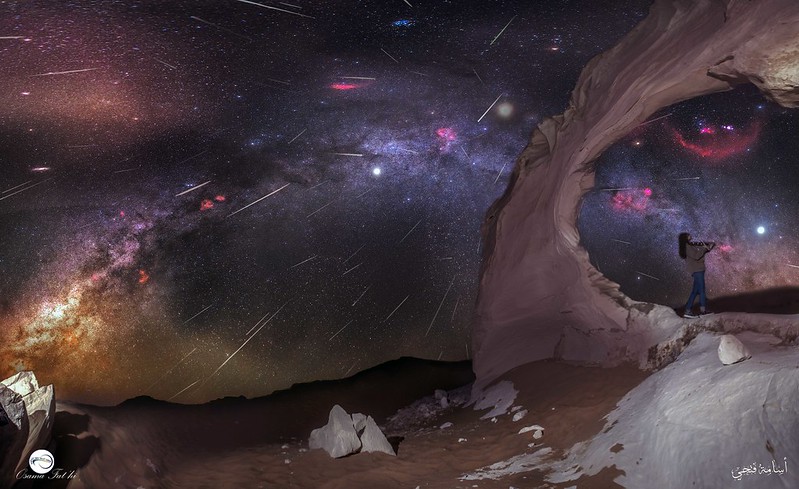 Gemeind Meteor shower with the violinst from the White Desert ( Cosmic Melody) by osama Fathi, on Flickr
Gemeind Meteor shower with the violinst from the White Desert ( Cosmic Melody) by osama Fathi, on Flickr
We travelled to the White Desert in Egypt for two nights, December 13–15, 2022, to observe and photograph the meteor shower. During those two nights, we saw more than 200 meteors, even with the moon in the sky. We took more than 1400 photos to document the meteors with a panorama of the Winter Milky Way and a panorama of the foreground taken from the Aqabat Area inside the White Desert.
Gears:
Nikon Z6 Mod, Skywacher star adventurer tracker , Nikkor 14-24 mm lens , Panorama Head
Settings :
- Winter Milky way Stacked tracked Pano : 8 columns *3rows, 24photos , 180 sec at Iso 1000@ 24mm f2.8
- Meteors: 1400*15 sec, ISO 8000 in the dark, ISO 4000 under the moonlight
-Foreground : 8 photos (one row) , 4 sec Iso 1000@ 24 mm
Softwares: Adobe Photoshop 2022, Pixinsight , Astrotools, Topaz Denoise
Osama Fathi
Social:
https://www.instagram.com/osama.fathi.nswatcher85/
https://www.facebook.com/NSWatcher/
Cairo, Egypt
Geminid Meteor Shower with the White Desert Arches, Egypt (13-14-15 Dec 2022)
She enjoyed the cosmic fireworks and the geminid meteor shower while playing the violin in the desert.
 Gemeind Meteor shower with the violinst from the White Desert ( Cosmic Melody) by osama Fathi, on Flickr
Gemeind Meteor shower with the violinst from the White Desert ( Cosmic Melody) by osama Fathi, on FlickrWe travelled to the White Desert in Egypt for two nights, December 13–15, 2022, to observe and photograph the meteor shower. During those two nights, we saw more than 200 meteors, even with the moon in the sky. We took more than 1400 photos to document the meteors with a panorama of the Winter Milky Way and a panorama of the foreground taken from the Aqabat Area inside the White Desert.
Gears:
Nikon Z6 Mod, Skywacher star adventurer tracker , Nikkor 14-24 mm lens , Panorama Head
Settings :
- Winter Milky way Stacked tracked Pano : 8 columns *3rows, 24photos , 180 sec at Iso 1000@ 24mm f2.8
- Meteors: 1400*15 sec, ISO 8000 in the dark, ISO 4000 under the moonlight
-Foreground : 8 photos (one row) , 4 sec Iso 1000@ 24 mm
Softwares: Adobe Photoshop 2022, Pixinsight , Astrotools, Topaz Denoise
Osama Fathi
Social:
https://www.instagram.com/osama.fathi.nswatcher85/
https://www.facebook.com/NSWatcher/
Cairo, Egypt
-
Jonathan_lost_in_space
- Asternaut
- Posts: 2
- Joined: Tue Dec 20, 2022 10:18 pm
Re: Submissions: 2022 December
Bubble Nebula (NGC 7635) Stellar Winds
This was almost 40hrs of narrowband exposures from a light polluted city, to capture the amazing stellar winds of the Bubble Nebula!
Bubble Nebula (NGC 7635)
https://www.astrobin.com/full/q29q1v/B/
Copyright: Jonathan Middleton https://cdn.astrobin.com/thumbs/tlRkoYF ... A78_uZ.png
This was almost 40hrs of narrowband exposures from a light polluted city, to capture the amazing stellar winds of the Bubble Nebula!
Bubble Nebula (NGC 7635)
https://www.astrobin.com/full/q29q1v/B/
Copyright: Jonathan Middleton https://cdn.astrobin.com/thumbs/tlRkoYF ... A78_uZ.png
Last edited by bystander on Wed Dec 21, 2022 4:34 am, edited 1 time in total.
Reason: Please, no hot links to images > 500 kb. Substituted smaller image.
Reason: Please, no hot links to images > 500 kb. Substituted smaller image.
Re: Submissions: 2022 December
Here is my version M-1, The Crab Nebula in SHO.
Things I learned while imaging this target:
1. While processing the OIII, I noticed the "stem" on the bottom of the target. I never new it was there. I added the OIII as a luminance layer to keep it visible.
2. There is a neutron star at the center.
3. The intricate filament structure that is throughout the target is called Rayleigh-Taylor Instabilities.
Target: M-1: The Crab Nebula
Imaging Telescope: Explore Scientific ED127 CF
Imaging Camera: ZWO ASI2600MM-Pro
Guide Scope: Explore Scientific ED127 CF
Guide Camera: ZWO 290mm-Mini
Mount: Sky Watcher EQ8-R Pro
Polar Alignment: ASIAir Plus
Bortle Class: 6
Filter: Chroma 3nm
30 x 600s (Ha)
42 x 600s (OIII)
30 x 600s (SII)
Integration: PixInsight
3, 9, 19 Dec 2022
Astrobin: https://astrob.in/goj59w/0/
Things I learned while imaging this target:
1. While processing the OIII, I noticed the "stem" on the bottom of the target. I never new it was there. I added the OIII as a luminance layer to keep it visible.
2. There is a neutron star at the center.
3. The intricate filament structure that is throughout the target is called Rayleigh-Taylor Instabilities.
Target: M-1: The Crab Nebula
Imaging Telescope: Explore Scientific ED127 CF
Imaging Camera: ZWO ASI2600MM-Pro
Guide Scope: Explore Scientific ED127 CF
Guide Camera: ZWO 290mm-Mini
Mount: Sky Watcher EQ8-R Pro
Polar Alignment: ASIAir Plus
Bortle Class: 6
Filter: Chroma 3nm
30 x 600s (Ha)
42 x 600s (OIII)
30 x 600s (SII)
Integration: PixInsight
3, 9, 19 Dec 2022
Astrobin: https://astrob.in/goj59w/0/
-
maxifalieres
- Ensign
- Posts: 18
- Joined: Fri Dec 18, 2020 6:39 pm
Re: Submissions: 2022 December
Picture of the NGC 1365 in Fornax
Taken in the Cielos Albertinos Astronomic Observatory, 17/12/2022
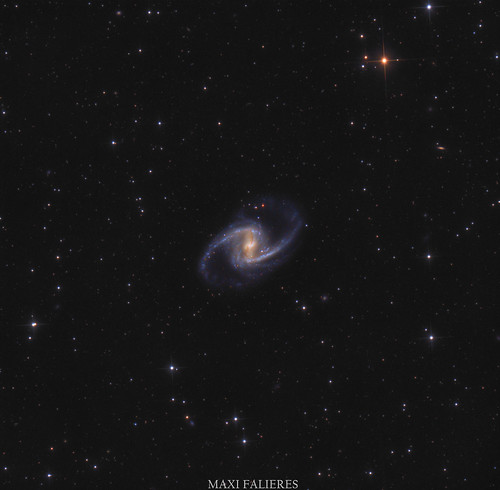
NGC 1365
by Maxi Falieres, en Flickr
Telescope GSO 200mm F4
ZWO 533 MC Pro + Coma Corrector
Skywatcher NEq6 mount
46 Lights de 3' Gain 101 -10°C
100 Darks
Light Polution: Bortle 2/3
Location: Observatorio Astronómico Cielos Albertinos
Alberti, Provincia de Buenos Aires, Argentina
Taken in the Cielos Albertinos Astronomic Observatory, 17/12/2022

NGC 1365
by Maxi Falieres, en Flickr
Telescope GSO 200mm F4
ZWO 533 MC Pro + Coma Corrector
Skywatcher NEq6 mount
46 Lights de 3' Gain 101 -10°C
100 Darks
Light Polution: Bortle 2/3
Location: Observatorio Astronómico Cielos Albertinos
Alberti, Provincia de Buenos Aires, Argentina
- felopaul
- Ensign
- Posts: 96
- Joined: Mon Apr 29, 2013 7:14 pm
- AKA: Felopaul
- Location: Flagey (France)
- Contact:
Re: Submissions: 2022 December
M20
RGB : SHORVB : full size/info : http://www.cielaustral.com/galerie/photo137.html
80 Hrs total frames
done with CDK 610, Moravian C4-16000 on PW L600 mount near Actacama Desert in Chile, El Sauce Observatory
http://www.cielaustral.com
Copyright: Team CielAustral with J.C CANONNE, M. SELBY, G.CHASSAIGNE, N.OUTTERS, P. BERNHARD, D. CHAPLAIN & L. BOURGON
RGB : SHORVB : full size/info : http://www.cielaustral.com/galerie/photo137.html
80 Hrs total frames
done with CDK 610, Moravian C4-16000 on PW L600 mount near Actacama Desert in Chile, El Sauce Observatory
http://www.cielaustral.com
Copyright: Team CielAustral with J.C CANONNE, M. SELBY, G.CHASSAIGNE, N.OUTTERS, P. BERNHARD, D. CHAPLAIN & L. BOURGON
Re: Submissions: 2022 December
Hi guys,NGC2237_HOO
Telescope: SharpStar 150 f2,8
Guide Scope:Evoguide
Mount : Skywatcher HEQ5
Imaging camera: ZWO 2600MC
Guiding camera: ZWO 290 MC
Filters: NBZ Idas
Plate solving: SGpro
Imaging software: Sgpro
Guiding software: PHD2
Processing software: Pixinsight
NBZ: 120X120s exposure@100 Gain
Integration: 4 hrs
Davide Mancini ,Perth,Australia,20/12/22
Telescope: SharpStar 150 f2,8
Guide Scope:Evoguide
Mount : Skywatcher HEQ5
Imaging camera: ZWO 2600MC
Guiding camera: ZWO 290 MC
Filters: NBZ Idas
Plate solving: SGpro
Imaging software: Sgpro
Guiding software: PHD2
Processing software: Pixinsight
NBZ: 120X120s exposure@100 Gain
Integration: 4 hrs
Davide Mancini ,Perth,Australia,20/12/22
-
ajpsleiman
- Asternaut
- Posts: 6
- Joined: Thu Nov 05, 2020 4:14 pm
- Location: Miami
- Contact:
Re: Submissions: 2022 December
Here are my submissions for December.
These are all single exposures taken in the Everglades National Park down in Florida! The orange glow in the back is the moon setting.
Gear used:
Sony a7r3
Sony 24-70 f4
Godox tt685s
Thanks
These are all single exposures taken in the Everglades National Park down in Florida! The orange glow in the back is the moon setting.
Gear used:
Sony a7r3
Sony 24-70 f4
Godox tt685s
Thanks
-
Herbert_Walter
- Ensign
- Posts: 16
- Joined: Sat Nov 05, 2022 2:56 pm
Re: Submissions: 2022 December
NGC 1097 ...
...is a barred spiral galaxy in the constellation Fornax (distance about 48 million light years).
It is a severely interacting galaxy with obvious tidal debris and distortions caused by interaction with the companion galaxy NGC 1097A.
More infos: https://www.skypixels.at/ngc1097_N17_info.html
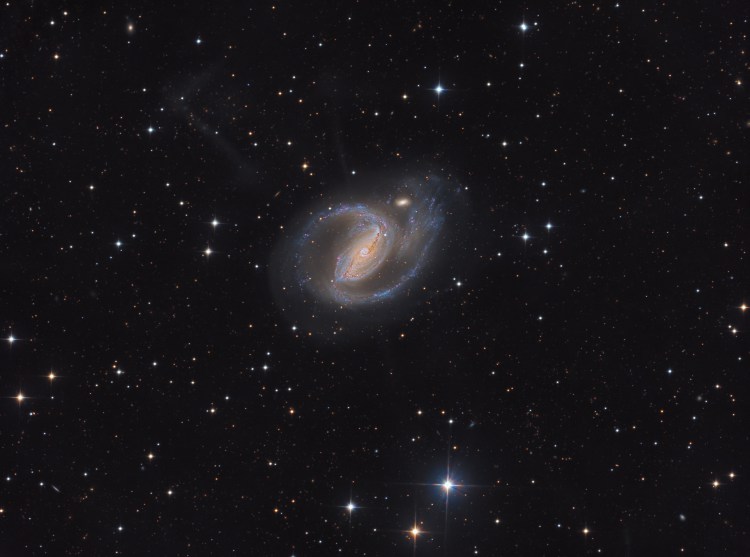
...is a barred spiral galaxy in the constellation Fornax (distance about 48 million light years).
It is a severely interacting galaxy with obvious tidal debris and distortions caused by interaction with the companion galaxy NGC 1097A.
More infos: https://www.skypixels.at/ngc1097_N17_info.html
-
MatthewPaul
- Asternaut
- Posts: 1
- Joined: Sun Dec 18, 2022 2:17 pm
Re: Submissions: 2022 December
120 Hours of M82
Copyright: Matthew M Paul
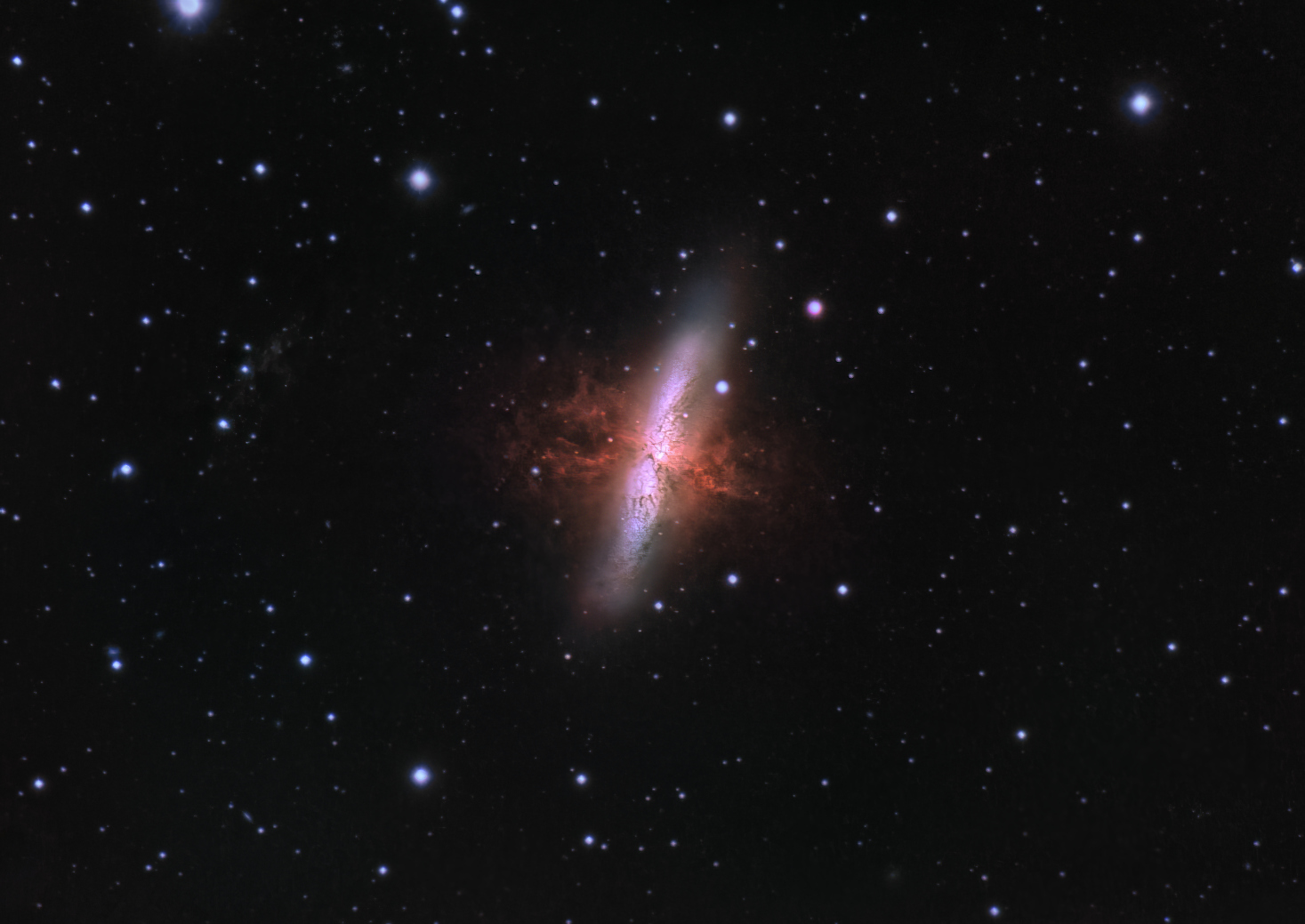
You can right click on the image and select "view Image" for a full res photo,
or see https://cdn.astrobin.com/thumbs/VLxjTZw ... XriP0L.jpg
Hello Everyone,
I don't generally share my images publicly but though that I would on this one.
I recently spent about 120 hours imaging M82 with a 9.25" Celestron, Reducer, Cooled IMX432 mono camera, Orion LRGB filters, and an Astronomik 12nm Hydrogen alpha filter. This was over an exactly one month period, covering 17 clear nights of imaging from November 13th to December 13th. 30 hours were spent with the Luminance filter, 8-12 hours each on RGB (more on Green and Blue), and 70 hours with the Hydrogen filter. Hydrogen was blended into the luminance channel, as well as the red channel.
I used 100 hours worth of the data in this image. This is this the most time that I have spent on a single image personally, and it is also the longest that I've seen a single person image the Galaxy Messier 82.
Not only does it look really neat but there is far more structure visible in this image than most other "Small Telescope" amateur image that I've seen. This is mainly due to the amount of time that was spent imaging. I did struggle with the stars looking "right" but at the end it's ok and we are always learning and improving.
Some interesting things to note:
• From what I have read, the Hydrogen being ejected from the core of M82 is propelled by massive amounts of stars going supernova.
• To the left of the galaxy you can see a small grey cloud. It would really be color much like the hydrogen near the galaxy, as it is also made of ionized hydrogen, by my camera and telescope were not sensitive enough to pick up on the red hue with the exposure time spend with the red color filter and the way that I edited it. This cloud feature is called "The Cap" and is not normally seen in small instruments or amateur images, from what I can tell
• Above the cap near the top edge of the image you can see a large grouping of tiny oval shapes. This is a cluster of galaxies that is around 2.5 billion light years away from us. Similarly there is a "Chain" cluster of small background galaxies to the right of M82.
• Throughout the image you can see small galaxies in the background of differing shapes sizes and colors.
• The image might seem dark, or bright, or the colors could be different on your screen as they are on mine. I need to calibrate my screens.
The camera has large 9um pixels, so the moderately sized sensor still only is 1600x1100px, a nice sized file. This is uncropped and 100% scale, but slightly compressed to meet the 500kb file size limitations.
DSS, Gimp, and Topaz AI were used to compile/edit.
Sub exposure times:
1000sec Hydrogen
300sec RGB
90 Sec Luminance
Thank you for your looking!
-Matt P
Copyright: Matthew M Paul

You can right click on the image and select "view Image" for a full res photo,
or see https://cdn.astrobin.com/thumbs/VLxjTZw ... XriP0L.jpg
Hello Everyone,
I don't generally share my images publicly but though that I would on this one.
I recently spent about 120 hours imaging M82 with a 9.25" Celestron, Reducer, Cooled IMX432 mono camera, Orion LRGB filters, and an Astronomik 12nm Hydrogen alpha filter. This was over an exactly one month period, covering 17 clear nights of imaging from November 13th to December 13th. 30 hours were spent with the Luminance filter, 8-12 hours each on RGB (more on Green and Blue), and 70 hours with the Hydrogen filter. Hydrogen was blended into the luminance channel, as well as the red channel.
I used 100 hours worth of the data in this image. This is this the most time that I have spent on a single image personally, and it is also the longest that I've seen a single person image the Galaxy Messier 82.
Not only does it look really neat but there is far more structure visible in this image than most other "Small Telescope" amateur image that I've seen. This is mainly due to the amount of time that was spent imaging. I did struggle with the stars looking "right" but at the end it's ok and we are always learning and improving.
Some interesting things to note:
• From what I have read, the Hydrogen being ejected from the core of M82 is propelled by massive amounts of stars going supernova.
• To the left of the galaxy you can see a small grey cloud. It would really be color much like the hydrogen near the galaxy, as it is also made of ionized hydrogen, by my camera and telescope were not sensitive enough to pick up on the red hue with the exposure time spend with the red color filter and the way that I edited it. This cloud feature is called "The Cap" and is not normally seen in small instruments or amateur images, from what I can tell
• Above the cap near the top edge of the image you can see a large grouping of tiny oval shapes. This is a cluster of galaxies that is around 2.5 billion light years away from us. Similarly there is a "Chain" cluster of small background galaxies to the right of M82.
• Throughout the image you can see small galaxies in the background of differing shapes sizes and colors.
• The image might seem dark, or bright, or the colors could be different on your screen as they are on mine. I need to calibrate my screens.
The camera has large 9um pixels, so the moderately sized sensor still only is 1600x1100px, a nice sized file. This is uncropped and 100% scale, but slightly compressed to meet the 500kb file size limitations.
DSS, Gimp, and Topaz AI were used to compile/edit.
Sub exposure times:
1000sec Hydrogen
300sec RGB
90 Sec Luminance
Thank you for your looking!
-Matt P
Re: Submissions: 2022 December
This one here was a difficult mosaic to do. I had a total of 12 sessions in APP due to different cameras, optics, exposure length, orientation, etc. I mixed some stuff from Telescope Live in with a ton of my own data from both here at home and from trips to Marfa TX. There were a total of 226x 120s, 180x 180s, 204x 300s, and 264x 600s totaling 77 hours and 32 minutes of integration taken with the Telescope Live AUS-2, CHI-5, CHI-6, Pentax K5 with Samyang 135 f/2, Pentax K5 with Borg 55FL f/3.6, Pentax K5 with WO Redcat 51, Pentax K3 with WO Redcat 51, and Pentax K3 with Borg 55FL f/3.6. All of this was processed in APP and Photoshop.
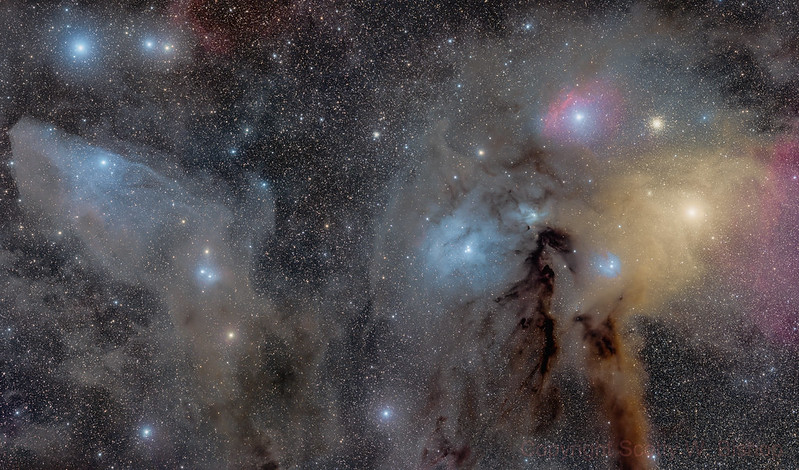 BHH_Rho_Mosaic by Scotty Bishop, on Flickr
BHH_Rho_Mosaic by Scotty Bishop, on Flickr
Full size is here: https://www.astrobin.com/hcfl0c/
 BHH_Rho_Mosaic by Scotty Bishop, on Flickr
BHH_Rho_Mosaic by Scotty Bishop, on FlickrFull size is here: https://www.astrobin.com/hcfl0c/
-
Meiying Lee
- Ensign
- Posts: 65
- Joined: Sun Aug 15, 2021 8:28 am
Re: Submissions: 2022 December
Sun Track on the Winter Solstice
Photo description:
Today, December 22, is the winter solstice, when the sun shines directly on the Tropic of Capricorn. The sun will rise from the most southerly point in the east, cross the southernmost sky, and set from the most southerly point in the west.
It is rare to see such clear weather in Taipei in winter, so I spent the whole day photographing the southernmost trajectory of the sun in the sky of Taipei! The tallest building on the left is Taipei 101. The sun was shot from 7:35 am to 4:02 pm with a sun filter applied. Startrails software was used to composite the sun tracks and foreground.
Equipment Details: Canon EOS 6D with Tokina 11mm Lens and Sun filter for images of the Sun
Location : Taipei, Taiwan
Time: December 22, 2022
Photographer : Meiying Lee (李美英)
Photo description:
Today, December 22, is the winter solstice, when the sun shines directly on the Tropic of Capricorn. The sun will rise from the most southerly point in the east, cross the southernmost sky, and set from the most southerly point in the west.
It is rare to see such clear weather in Taipei in winter, so I spent the whole day photographing the southernmost trajectory of the sun in the sky of Taipei! The tallest building on the left is Taipei 101. The sun was shot from 7:35 am to 4:02 pm with a sun filter applied. Startrails software was used to composite the sun tracks and foreground.
Equipment Details: Canon EOS 6D with Tokina 11mm Lens and Sun filter for images of the Sun
Location : Taipei, Taiwan
Time: December 22, 2022
Photographer : Meiying Lee (李美英)
Last edited by bystander on Thu Dec 22, 2022 3:32 pm, edited 2 times in total.
Reason: removed superfluous <img2> tag
Reason: removed superfluous <img2> tag
Re: Submissions: 2022 December
Re: Submissions: 2022 December
Re: Submissions: 2022 December
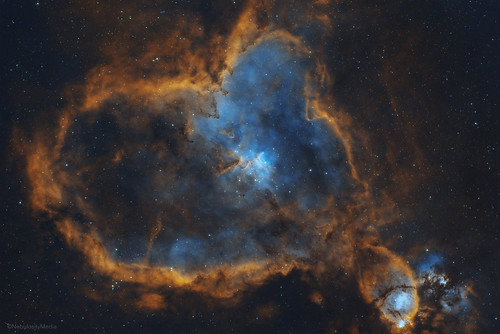 Heart Nebula (IC 1805) by Harley Grady, on Flickr
Heart Nebula (IC 1805) by Harley Grady, on FlickrThe Heart Nebula (as you can tell its name by its shape) is an emission nebula located in the constellation Cassiopeia approximately 7,500 light years away. Shot in Narrowband from a bottle 5 skies.
Shot on a ZWO ASI 2600 MC
TS Optics 90mm CF APO Refractor Telescope
26x600s - 4.3hrs of total integration time.
Edited in Pixinsight/Photoshop
©NebulosityMedia 2022
-
vanamonde81
- Science Officer
- Posts: 143
- Joined: Fri Apr 12, 2013 7:46 am
Re: Submissions: 2022 December
Christmas Eve Moon
Copyright: György Soponyai
I observed and captured the last waxing crescent Moon of 2022 on Chrismas Eve. At the time the photo was taken the age of the Moon was 29 hours and 03 minutes.
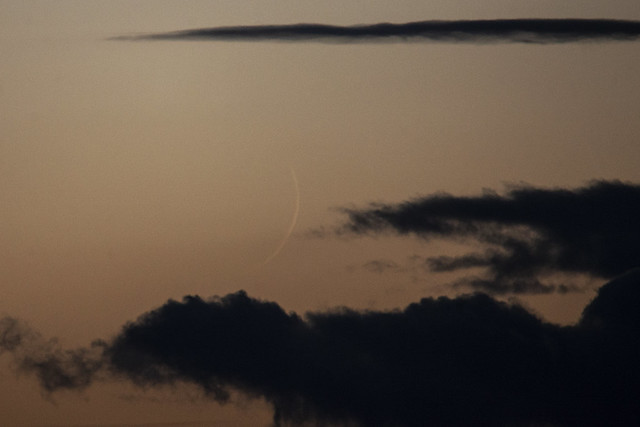
2022.12.24. Mogyoród, Hungary
Canon EOS 5D Mark II + Tamron EF 150-600 @600mm
1/250 sec, f/6.3, ISO 640
Copyright: György Soponyai
I observed and captured the last waxing crescent Moon of 2022 on Chrismas Eve. At the time the photo was taken the age of the Moon was 29 hours and 03 minutes.

2022.12.24. Mogyoród, Hungary
Canon EOS 5D Mark II + Tamron EF 150-600 @600mm
1/250 sec, f/6.3, ISO 640
-
martinkonrat
- Ensign
- Posts: 39
- Joined: Sun Sep 11, 2022 12:53 pm
Re: Submissions: 2022 December
 jgf
jgfNGC2170, aka The Angel Nebula. Newtonian Astrograph Version. OSC camera.
A very faint complex of emission, reflection and dark nebulae in the constellation Monoceros. It´s hard to acquire the data and also hard to process it. I tried 8 different workflows to get to this final image and it´s a bit far from what I was expecting, in a bad way
🗓 December, 20th to 23th. 2022
🕶 Optolong UV/IR filter
- 141 x 180s frames (7h3min)






